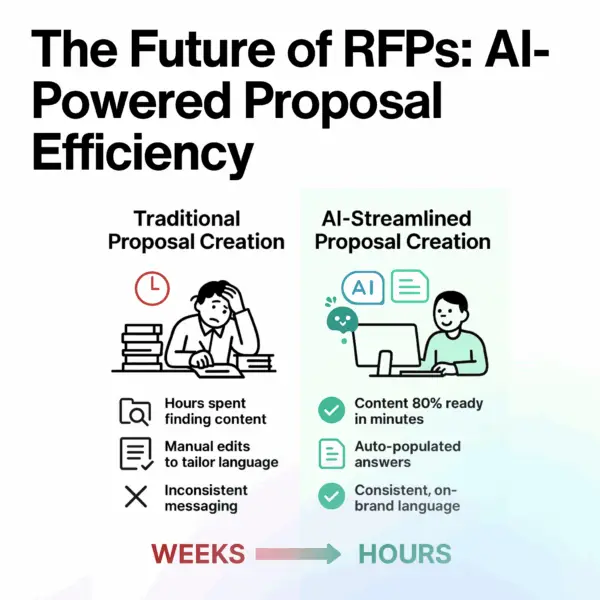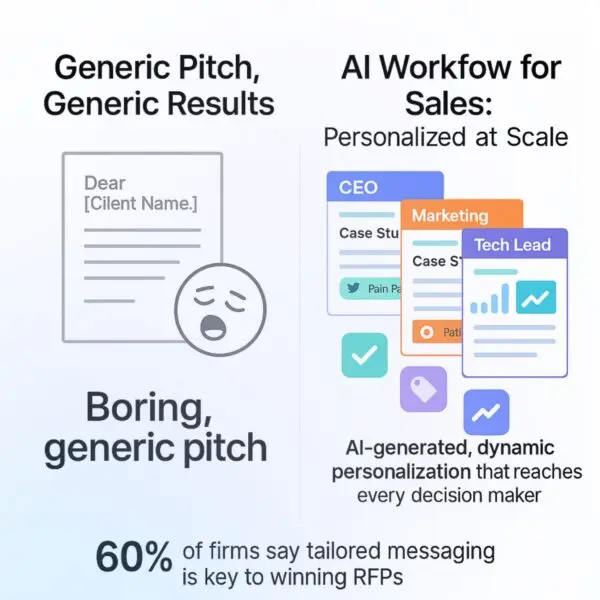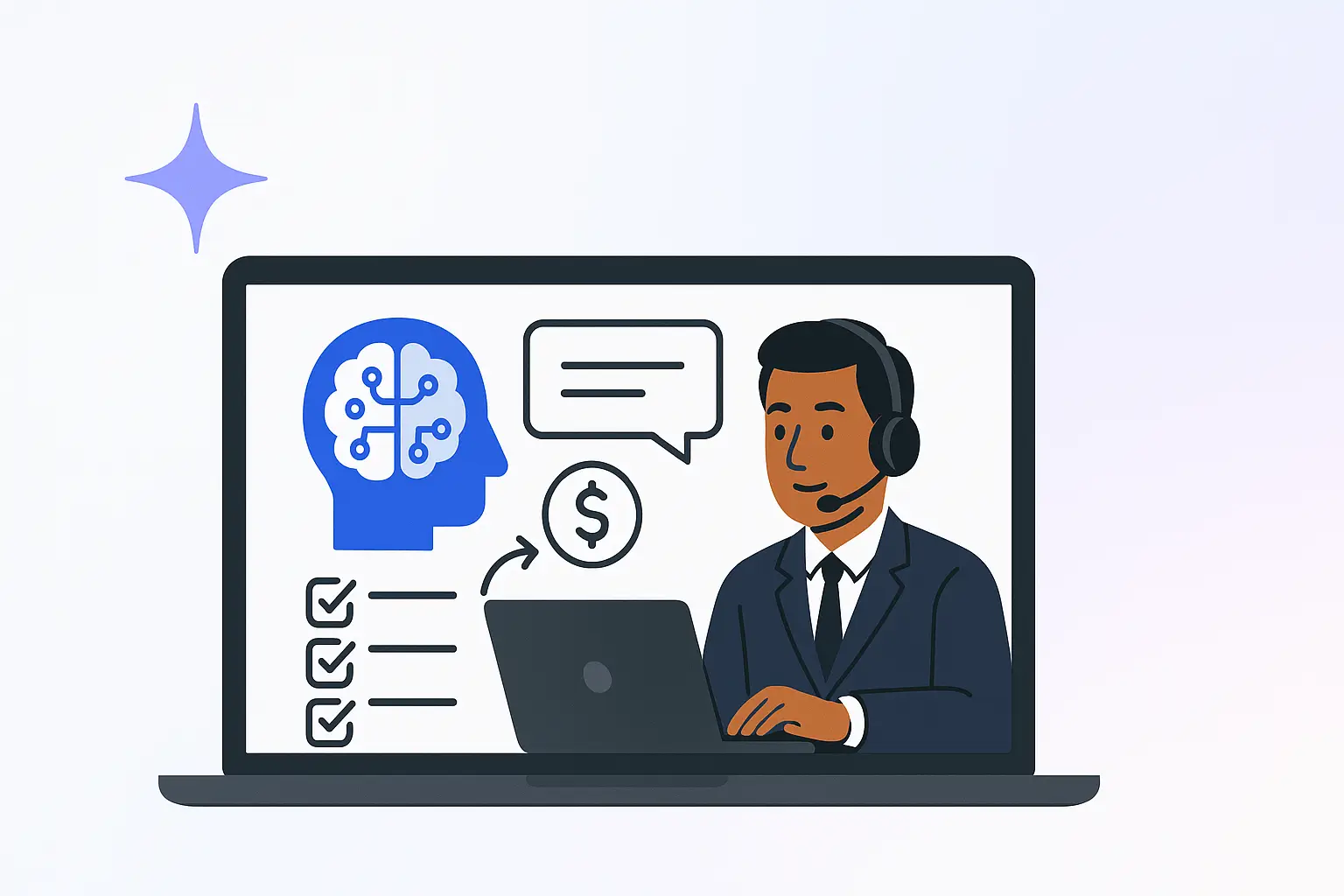AI Workflow for Sales – You may be wondering how that works exactly. Sales teams in U.S.-based marketing and creative agencies are currently navigating increasingly complex challenges: tighter client budgets, longer sales cycles, and the intricate demands of RFP processes. With these mounting pressures, AI Workflow for Sales has emerged as a transformative solution, redefining sales strategies and enabling agencies to close 30% more clients.
This blog explores how AI workflows streamline processes, reduce RFP response times, and deliver data-driven personalization to enhance client acquisition. Let’s dive in to understand how embracing AI workflows can give your sales team a competitive edge.
A New Era for Sales Teams
The business development landscape is undergoing seismic shifts. In 2023, many agencies faced challenges like longer sales cycles, shrinking budgets, and increased difficulty breaking through to decision-makers. These challenges demand innovative solutions to achieve more with fewer resources. But with AI now in the picture, everything is changing.
AI Workflows for Sales are designed to streamline RFP processes, automate repetitive tasks, and enhance sales strategies. Agencies that have adopted AI workflows are already seeing measurable results, including shorter turnarounds, higher-quality proposals, and improved win rates.
As of late 2023, 77% of ad agencies reported plans to integrate AI into their business development strategy by 2024, recognizing its potential to stay competitive (RSW/US via Adweek, 2024). Meanwhile, 60% of marketers believe their partner agencies gain a significant advantage by using AI, transforming these tools from optional to essential.
Streamlining Proposal Creation with Automated Content Generation
One of AI’s most visible impacts is in automated content generation, particularly for RFP responses and sales proposals. Traditionally, proposal teams spent countless hours searching for past content, copying boilerplate responses, and tailoring language for every new RFP.
How AI Transforms This Process:
AI tools now automate these tedious tasks, generating draft responses that are 80% complete in minutes. This enables sales teams to focus on refining messaging and crafting compelling narratives.
Example Success:
A leading agency, 500 Designs, reduced the time to draft a RFP response by 80%, cutting the effort from weeks to hours. They achieved this by using generative AI (Aurora) to analyze client resources, past proposals, learn preferred language, and auto-populate answers with relevant content.
Key Benefits:
- Efficiency Gains: Over 50% of RFP content typically consists of repetitive or duplicative answers, allowing AI to handle the bulk of the work.
- Strategic Focus: Teams can redirect their energy toward sharpening value propositions and storytelling.
Beyond speed, AI Workflow for Sales ensures greater consistency and accuracy, cross-verifying facts against a centralized knowledge base.
Creating sales proposals has long been a time-consuming, repetitive process—but that’s changing fast. With the rise of an AI Workflow for Sales, teams can now draft high-quality proposals in a fraction of the time, without sacrificing consistency or brand voice. The visual below compares the old way to the new, showing exactly how AI streamlines proposal creation from weeks to hours.

To better understand the impact of AI workflows, let’s compare the traditional sales process with a modern AI-powered approach. The table below highlights key differences in efficiency, effectiveness, and results, showing how an AI workflow for sales can transform agency performance:
Traditional vs. AI Workflow for Sales
| Process Step | Traditional Sales Workflow | AI Workflow for Sales |
|---|---|---|
| Proposal Creation | Manual drafting; weeks of effort; risk of inconsistency | Automated drafting; 80% complete in minutes; consistent and accurate |
| Lead Qualification | Gut instinct, manual research, slow go/no-go decisions | AI-driven scoring; instant qualification; focus on high-probability leads |
| Personalization | Superficial customization; limited by time/resources | Dynamic, data-driven personalization at scale; tailored for each client |
| Data Use & Analysis | Siloed; often anecdotal; slow feedback loops | Real-time analytics; win/loss scoring; continuous improvement |
| Efficiency | Repetitive manual work; high risk of errors | Automation of routine tasks; significant time and error reduction |
| Win Rates | Difficult to improve systematically | Measurable improvements (e.g., 30% higher win rates) |
| Reporting & Insights | Manual compilation; delayed insights | Automated, visually appealing reports; actionable insights instantly |
Intelligent Qualification: Focusing on the Right Opportunities
Not every RFP or lead is worth pursuing. AI tools for intelligent qualification help agencies prioritize high-value opportunities.
How It Works:
AI recommendation engines assess incoming RFPs against an agency’s past wins, capabilities, and capacity. They flag RFPs that closely match successful projects while warning against opportunities outside the agency’s expertise (Evalueserve, 2023).
Key Benefits:
- Faster Go/No-Go Decisions: AI tools can scan and summarize RFPs “in seconds rather than days,” highlighting compliance requirements and budget scope.
- Improved Success Rates: High-performing organizations are selective, with 6 out of 7 using a formal RFP evaluation process to focus on high-probability opportunities.
By analyzing inbound leads, AI-powered assistants also score their fit and conduct initial outreach, enabling sales teams to focus on genuine opportunities.
Dynamic Personalization of Pitches and Proposals
Personalization is critical to winning new clients. Generic pitches no longer cut it in today’s competitive landscape.
How AI Enhances Personalization:
AI enables dynamic personalization at scale, tailoring proposals to individual client needs. Tools auto-fill client-specific details into templates, incorporating relevant case studies, industry-specific proof points, and client pain points.
Example Impact:
A recent study found that 60% of firms cite tailored messaging as critical to winning RFPs (Agility PR Solutions, 2024).
Key Benefits:
- Tailored Messaging: AI generates multiple proposal versions for different decision-makers, such as CEOs and marketing managers.
- Brand Consistency: AI ensures all content remains aligned with the agency’s style guide.
Dynamic personalization allows agencies to pursue more opportunities while making each client feel uniquely understood.

Data-Driven Decision-Making and Continuous Improvement
AI analytics transform sales workflows into a cycle of continuous improvement. By analyzing historical proposal data, agencies can identify patterns that drive success.
Example Insights:
One agency discovered that proposals emphasizing specific services had a 30% higher win rate, while another achieved a 25% boost in client acquisition by refining their messaging (ProcureSpark Blog, 2024).
Key Benefits:
- Real-Time Feedback: AI provides “win likelihood” scores and flags weaknesses in drafts before submission.
- Long-Term Optimization: Continuous analysis ensures each proposal iteration improves over time.
AI also integrates with CRM platforms, offering insights into client targeting and conducting win/loss analyses to refine strategies.
AI Workflow for Sales’ Business Impact: Efficiency, Win Rates, and Growth
Agencies embracing AI-driven sales workflows are achieving significant business outcomes:
- Efficiency Gains: Generative AI reduces RFP response times by up to 90% (Info-Tech Research Group, 2022).
- Higher Win Rates: Agencies using AI in their RFP processes are 3× more likely to achieve revenue growth (Responsive.io).
- Improved Strategy: AI insights help teams focus on high-value opportunities and continuously refine their approach.
Transforming How Agencies Pitch and Win AI is redefining the art of the pitch by combining automation, analytics, and personalization. Marketing and creative agencies leveraging AI workflows are streamlining operations, improving proposal quality, and closing more deals.
In a competitive landscape, AI-driven workflows empower agencies to respond faster, tailor solutions more convincingly, and continuously improve outcomes. As the technology evolves, those who adopt intelligent, automated, and data-driven sales strategies will lead the future of business development.
FAQs: AI Workflow for Sales
Q1: What is an AI workflow for sales?
A: An AI workflow for sales is a set of automated, data-driven processes that leverage artificial intelligence to streamline and enhance every stage of the sales cycle. This includes proposal generation, lead qualification, personalized outreach, real-time analytics, and continuous optimization—helping sales teams work smarter and close more deals.
Q2: How does an AI workflow for sales help with proposal creation?
A: AI-powered workflows can automatically generate proposal drafts by pulling from a central knowledge base. They fill in repetitive sections, ensure compliance with RFP requirements, and maintain brand consistency, reducing proposal creation time from weeks to hours.
Q3: What are the main benefits of implementing an AI workflow for sales?
A: Key benefits include faster proposal turnaround, improved lead prioritization, hyper-personalized client communication, continuous performance tracking, and higher win rates—often enabling teams to close up to 30% more clients.
Q4: Can small agencies benefit from an AI workflow for sales?
A: Absolutely. AI workflows level the playing field by automating time-consuming tasks, ensuring high-quality outputs, and providing insights that help smaller teams compete with larger agencies.
Q5: How does AI workflow for sales impact client relationships?
A: AI enables more timely, relevant, and personalized communication at scale, ensuring prospects receive the right message at the right time, which strengthens engagement and builds trust.
Q6: Is it difficult to implement an AI workflow for sales?
A: Many modern AI tools are designed for easy adoption, with intuitive interfaces and integrations for CRM, proposal management, and communication platforms. Agencies can often see benefits within days or weeks of implementation.
Q7: What results can agencies expect after adopting an AI workflow for sales?
A: Agencies typically see significant reductions in proposal turnaround time (often up to 90%), improved accuracy and consistency, increased win rates, and ultimately, accelerated revenue growth.
